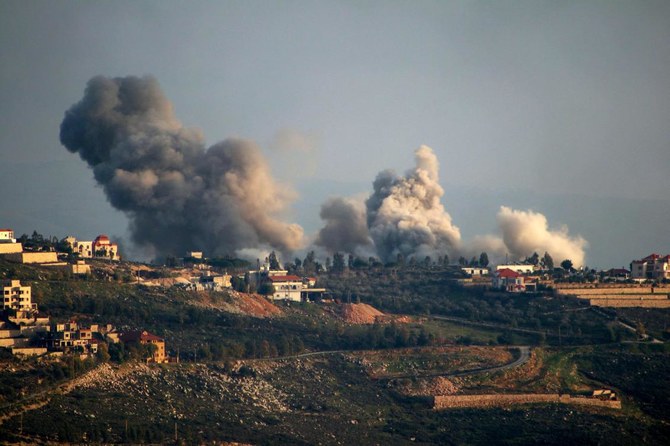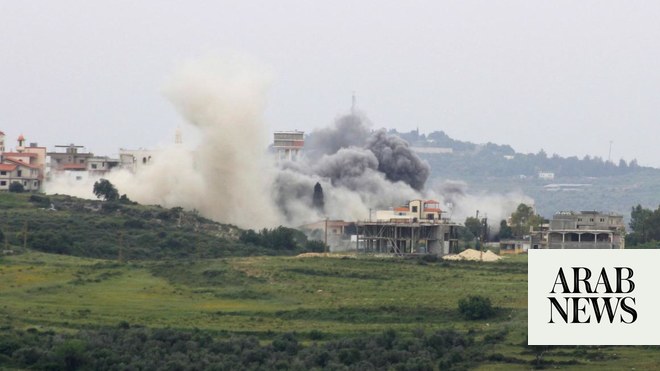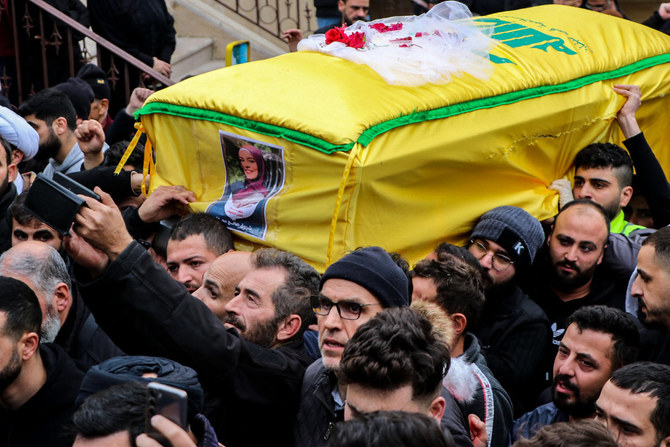
A civilian was killed, and two other people injured, one critically, when a missile struck a house in the village of Khiam
And in a separate incident, an Israeli drone attack hit pumping systems drawing spring water from the Wazzani
BEIRUT: Israeli bombing in southern Lebanese border areas on Wednesday left one person dead and caused major damage to water supply networks.
A civilian was killed, and two other people injured, one critically, when a missile struck a house in the village of Khiam.
And in a separate incident, an Israeli drone attack hit pumping systems drawing spring water from the Wazzani.
The right to pump water from the Wazzani, which feeds into the Hasbani River, has been at the center of a row between Lebanon and Israel since 2002.
Several towns and villages in the border region are reliant on water supplies from the Wazzani.
The strikes came as Israeli warplanes reportedly carried out low-flying sorties over Nabatieh, Arab Salim, Al-Zararieh, and Beirut.
Limited Hezbollah military operations against the Israeli army took place in Shebaa Farms and Kfarchouba, in occupied Lebanese territory.
Separately, two Hezbollah members were killed during an Israeli raid on Homs, according to the Syrian Observatory for Human Rights.
And Israeli jets were reported to have launched attacks on the towns of Hula, Bani Hayyan, and Marwahin.
Meanwhile, South Lebanon Water Establishment officials were due to assess the scale of the damage caused to the Wazzani water pumps.
Water from the spring eventually flows through other tributaries into the Jordan River, which feeds Lake Tiberias, Israel’s main freshwater source.
In 2004, Lebanon opened a pumping station on the Wazzani River, increasing drinking supplies for 20 southern villages to 11 million cubic meters per year, sparking outrage from Israel.
Ali Taher Yassin, president of the Union of Jabal Amel Municipalities, told Arab News: “The Wazzani pumps directly cover the Wazzani region, Ain Arab, and a significant part of Khiam, Kfarkila, Odaisseh, Markaba, Houla, Rab Al-Thalathin, and Blida.
“They also supply the pumping stations of Markaba and Taybeh indirectly, which amounts to 42 southern villages.
“The pumps are functioning at only one-third of their capacity due to existing faults that the state has not yet been able to repair.
“The dispute with the Israeli side was over the amount of water being pumped.
“It is an open area, and the Israeli objective of bombing it is to make people thirsty and harm the area,” he said.
Also on Wednesday, a planned visit by Egyptian Minister of Foreign Affairs Sameh Shoukry to Lebanon, and the capital Beirut, was postponed.
Following a meeting, the Maronite bishops warned “against the ongoing attempts, internationally and locally,” for the demarcation of borders between Lebanon and Israel “devoid of any clear international guarantees.”
The bishops noted that only Lebanon’s president had the authority to negotiate on the issue, and that the only way to safeguard the border area was “by improving the political and diplomatic environment.”











